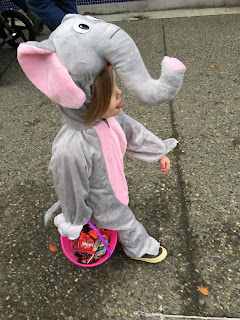Elephants in the room
Bedtime theology with the 4 yo...
(Reading bedtime Bible stories)
4 yo: I wanna read that sad one! (Points to story of Sacrifice of Isaac).
Me: Oh that one's pretty sad, maybe we'll do that another night.
4 yo: Please? Please?!
Me: Ah.....well, okay, but it's a difficult story.
(Read the story. No comment from the 4 yo. Halfway into the next story about Jacob, Rachel and Leah....)
4 yo: I don't wanna get cut.
Me: Oh honey are you thinking about that story we read?
4 yo: Yeah and what if God wants me to get cut?
Me: Oh sweetie. I'm sorry we read that story, Mommy should have skipped it. You don't have to worry about being hurt, no one wants you hurt and you're safe.
4 yo: But God is in charge of everyone, even the president and God makes the rules. He maybe wants me to get cut!
Me: That is a hard story. But that happened a long time ago and that won't happen again. It is scary. Mommy doesn't really like that story either.
4 yo: I'm scared.
Me: You're safe baby, you're safe. God loves us and that won't happen again. I love you. You're safe. Should we read this next story now?
4 yo: Yeah but only if there's no killing.
Me: No killing in this one, honey.
I had somehow succeeded in keeping this story of the (near) sacrifice of Isaac away from my older child. Perhaps I flipped the page fast enough, made up some excuse. But this younger child was not to be persuaded. I should have known better.
The story from Genesis chapter 22 is basically a story of how Abraham attempts to murder his only son after hearing a voice from God instructing him to do so. The scripture says that God was testing Abraham. Well, it is also a felony in every state. It is child abuse. It is unequivocally wrong. I would not let my child watch this movie. But I read the story (with pictures!) to my son because it was in the Bible. Honestly, it's stuff like this that make people abandon organized religion.
Author Cindy Wang Brandt wrestles with this scripture in an essay on her website. I was struggling on how to reflect on this bedtime theology chat; a Google search yielded Brandt's helpful reflection. Brandt aptly notes that we never hear Isaac's point of view in this story (can you imagine the therapy this kid would need?) and that the role of children in antiquity and even more recent history was dismissive at best and brutal at worst. Infanticide was a reality and children existed to work on your farm or other jobs and support you as you aged (if they made it to adulthood). I come from a line of Norwegian farm families who had 8, 9 and even 11 children who were expected to labor all day long.
Put in that context, it wasn't shocking to earlier Biblical readers that someone might attempt to sacrifice their child as a test of faith. But now, that is not okay. In her essay, Brandt advises parents of young children to simply avoid the story (whoops) and for those with older children, to name it as wrong and assure the child they are safe, and then let the text stand as it is, making space for the dissonance, accepting the elephant in the room. Her ethic matches my own, as I've written earlier about making space for uncomfortable scriptures and allowing some things to remain a mystery.
When the mysteries are violent, though, we don't have to live comfortably with them. We can name them. Brandt reminds us to name and call out injustices and violence not just in scripture but in our world. "Those who insist upon elevating the morality of the Bible over human decency is part of a huge problem," she writes. "When orthodoxy trumps human lives, you're choosing toxicity with religious arrogance."
You can easily scroll the news these days and find someone who places their religious orthodoxy over human lives. Insert your own political rant here. It is one thing to name the violence toward Isaac as wrong. The next step is to speak out on those situations in our world where the violence toward the vulnerable is similarly wrong. And when appropriate, we can let our children hear us renouncing the violence, and that we value something different. And so does God.



Thank you for sharing on this tough story, and connecting it to our world today and the "tough topics." Yes, our children need to hear and see us renouncing violence, and other signs of injustices.
ReplyDeleteThanks, Jamie. I think these questions and challenges with kiddos are going to just get harder. Important but hard work, indeed!
Delete